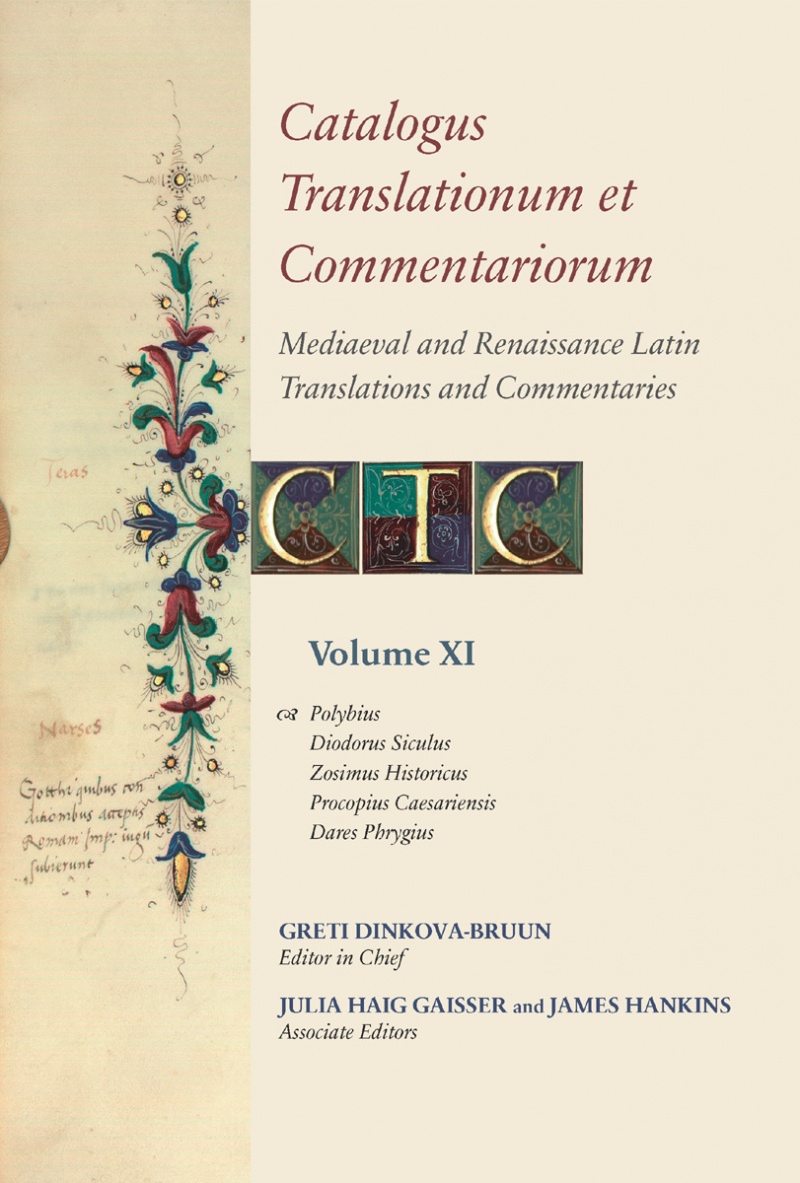
Catalogus Translationum et Commentariorum, Volume XI
Mediaeval and Renaissance Latin Translations and Commentaries: Annotated Lists and Guides
CTC 11. 2016. xl, 416 pp. ISBN 978-0-88844-951-1 • Cloth • $95
In this volume, the eleventh in the series, five full-length articles devoted to Polybius, Diodorus Siculus, Zosimus, Procopius of Caesarea, and the fictitious Dares Phrygius are supplemented by addenda and corrigenda to articles previously published on Valerius Maximus, Petronius Arbiter, Martialis, and Martianus Capella.
Founded in 1946 by Paul Oskar Kristeller, the Catalogus Translationum et Commentariorum has become an indispensable research tool for scholars interested in the history of the classical tradition in the West during the Middle Ages and the Renaissance. Each article treats a separate classical author, beginning with a detailed essay on the author’s reception from antiquity to A.D. 1600 and, in some cases, even up to the present day. This ‘Fortuna’ is followed by a comprehensive list both of manuscript and printed commentaries on each Latin author and, in the case of Greek authors, a list of Latin translations as well. Since the publication of the first volume in 1960, the Catalogus has published articles on nearly a hundred classical authors, with dozens more in active preparation. The project boasts an international team of contributors from fourteen countries in Europe and North America. Given the ever-growing interest in the history of classical reception across departments of English, European languages, and comparative literature, the foundational scholarship that is the hallmark of the CTC has become more vital than ever to research in the humanities.
Contents
Preface, by Greti Dinkova-Bruun • vii
Preface to Volume I, by Paul Oskar Kristeller • xvii
General Bibliography • xxv
Abbreviations • xxxvii
Greek Authors
Polybius, by Jeroen De Keyser (University of Leuven) • 1
Diodorus Siculus, by John Monfasani (University at Albany - SUNY) • 61
Zosimus Historicus, by Francesca Niutta (Rome, Italy) • 153
Procopius Caesariensis, by Réka Forrai (Centre for Medieval Literature, University of Southern Denmark) • 211
Latin Authors
Dares Phrygius, by Frederic Clark (New York University) • 237
Addenda et Corrigenda
Valerius Maximus, by Marijke Crab (University of Leuven) • 307
Petronius Arbiter, by Bratislav Lučin (Marulianum, Split, Croatia) • 337
Martialis, by Marianne Pade (Danish Academy at Rome, Århus University) • 371
Martianus Capella, by Sinéad O'Sullivan (Queen's University, Belfast) • 383
Index of Ancient and Medieval Authors and Works • 401
Index of Manuscripts • 405
Index of Translators and Commentators • 410
Index of Ancient Authors Treated in Volumes I–XI • 415
Editors
Greti Dinkova-Bruun is a Fellow and Librarian of the Pontifical Institute of Mediaeval Studies, Toronto. She has edited Alexander Ashby’s Opera Poetica for the Corpus Christianorum Continuatio Mediaevalis (2004) and The Ancestry of Jesus: Excerpts from “Liber Generationis Iesu Christi Filii Dauid Filii Abraham” for Toronto Medieval Latin Texts (2005). Her numerous articles have appeared in Mediaeval Studies, Viator, Sacris Erudiri, Mittellateinisches Jahrbuch, and Archives d’histoire doctrinale et littéraire du Moyen Âge, among other journals.
Julia Haig Gaisser is Eugenia Chase Guild Professor Emeritus in the Humanities and Professor Emeritus of Latin at Bryn Mawr College. Her article on Catullus appeared in CTC 7 in 1992. She is the author of Catullus and His Renaissance Readers (1993), The Fortunes of Apuleius and the “Golden Ass”: A Study in Transmission and Reception (2008), and Catullus (2009); she is also the editor and translator of Pierio Valeriano on the Ill Fortune of Learned Men: A Renaissance Humanist and His World (1999) and Giovanni Gioviano Pontano’s Dialogues: Charon and Antonius (2012).
James Hankins is Professor of History at Harvard University and founder and general editor of the I Tatti Renaissance Library, published by Harvard University Press. The author of a seminal study, Plato in the Italian Renaissance (1990; Italian translation, 2009), he is editor of The Cambridge Companion to Renaissance Philosophy (2007) and (with Fabrizio Meroi) The Rebirth of Platonic Theology (2013), as well as editor and translator of Leonardo Bruni’s History of the Florentine People (2001–2007) and editor of Marsilio Ficino’s Platonic Theology (2001–2006).
Endorsements
“This is the second volume of the Catalogus (the now seventy-year-old brainchild of the great Renaissance scholar Paul Oskar Kristeller) to be published in a new format under the editorship of Greti Dinkova-Bruun. By happy coincidence, all the articles it contains deal broadly with what may be described as ancient historiography. The four Greek contributions deal with two Hellenistic writers, Polybius and Diodorus Siculus, and two from late antiquity, Zosimus and Procopius of Caesarea. On the Latin side, the one entry deals with the widely disseminated and highly influential pseudohistory of the Trojan War by Dares Phrygius, also a product of late antiquity. As always, contributors combine detailed and accurate information about manuscripts and early printed editions with copious quotations of paratextual material. Each article begins with an overview of the author’s reception, in some cases reaching up to the present day. I am confident that this collection, like its predecessors, will quickly become the essential first port-of-call for scholars interested in the fortuna of the authors and works with which it is concerned.” – Keith Sidwell, University of Calgary
Ordering
Customers in North America please order through University of Toronto Press Distribution by phone (1-800-565-9523) or by email (utpbooks@utpress.utoronto.ca). If you would like to order through UTP Distribution using another method such as mail or fax, please click here for a full list of contact and ordering methods. PIMS books are also available on Amazon.ca (for Canadian customers) and Amazon.com (for customers in the U.S.).
Customers outside North America please order through Brepols Publishers. PIMS books are available through the Brepols online catalogue.


